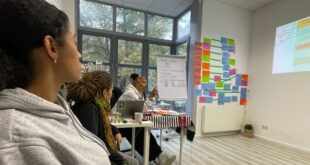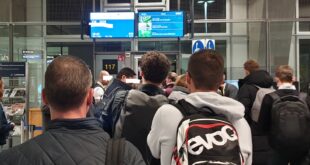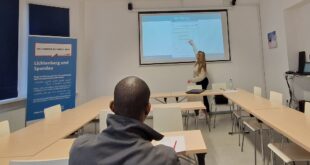Many migrants living in asylum shelters in Germany have tested positive for the coronavirus (Covid-19). Strict social distancing measures to combat the virus outbreak are hard to adopt in centres where people live together in tight spaces, reports Charlotte Hauswedell
Germany has imposed strict rules on social distancing, and some federal states have ordered lockdowns in a bid to prevent the spread of the coronavirus. Hostels for asylum-seekers are affected too, but measures differ between states.
Here are examples of what measures have come into effect in the different states, as reported by the German press agency dpa:
Testing upon arrival
- All newly arriving asylum-seekers are tested for the coronavirus in centres in the states of Bavaria, Bremen, Saxony, Baden-Württemberg, Schleswig-Holstein.
- In Bremen, tested persons are put in quarantine until results are in.
- In Baden-Württemberg, Saxony and Brandenburg, tested persons are put in separate accommodation and in Schleswig-Holstein only those showing symptoms are isolated.
- In North-Rhine Westphalia, asylum-seekers are screened for symptoms and asked about their travel routes. There are five first reception centres in the state which have rotating reception cycles: only one centre at a time admits new asylum-seekers for several days followed by a suspension on reception and transfers for two weeks.
- In Lower Saxony, new arrivals are examined. Tests are only done if people show symptoms or if it is seen as necessary due to the asylum-seeker’s travel route.
- Thuringia tests if people show first symptoms.
Coronavirus cases in asylum centers
At the time of reporting on 23 March, the German news agency dpa collected the following data on infections:
- Berlin has registered 4 positive cases of coronavirus among asylum-seekers in asylum centres in the state. One staff member in a centre also tested positive.
- In Bavaria, 10 out of 1,900 asylum-seekers tested were infected.
- In Saxony and Schleswig-Holstein, there are reportedly 2 registered cases each
- Baden-Württemberg, there are 8 cases.
- Hesse, Thuringia: 1 each
- Bremen, North-Rhine Westphalia and Lower-Saxony: none
Isolation measures
Asylum-seekers who are tested positive, contact persons as well as suspected cases are put in isolation, meaning they are accommodated separately. That’s according to the interior ministries of all the states that responded to dpa’s information request.
Restriction measures
Asylum centres have introduced restrictive measures in line with the measures that are implemented in almost all parts of public and private life in Germany. These include:
- Stricter hygiene rules like more frequent cleaning of the facilities
- North-Rhine Westphalia centres report they have put up disinfectant stations
- Bremen centres report they have switched to handing out foil-wrapped food only
- In many centres, school classes, nursery care and integration courses have been suspended
- Many centres have also closed common areas to avoid gatherings of people
- Everyone is required to keep a distance of at least 1.5 meters between themselves and other people. To make this possible, some centers report they have put on the floor indicators for distance.
- Some canteens have introduced lunch in “shifts” or take-away lunches to avoid large group gatherings
Information in foreign languages
- Asylum centres across the country are putting up health advice and information about preventive measures against the coronavirus. These can be in the form of posters or flyers, for example.
- The centres are also attempting to make the information available in other languages beside German or English.
- The Berlin office for refugees (Landesamt für Flüchtlingsangelegenheiten, LAF) published information about the coronavirus and quarantine in asylum centres in several languages. It’s available online as audio files:
- According to LAF, many asylum-seekers in the centres have formed WhatsApp or Facebook groups where they keep each other informed, too.
- For general information on coronavirus: The website of the Federal Commissioner for Migration, Refugees and Integration offers information about Covid-19 in 11 foreign languages including English.
- The Robert-Koch Institute publishes daily situation reports on Covid-19 in English as well as German. They include information about the epidemiological situation in Germany, risk areas and measures taken by the government such as border restrictions.
*Note: Not all 16 states responded to the information enquiries sent out by dpa reporters. This article does not represent a complete list of measures taken in all German states.
Aid and counselling suspended
In addition to measures taken inside asylum centres like trying to keep a 1.5 meter distance between people, the coronavirus measures are also taking its toll on volunteer and migrant aid services. Many organisations have had to reduce their staff numbers. Integration and language courses are put on hold. Personal counselling or in person contact is no longer possible, and in some asylum centres, non-residents are not allowed to enter the building. This means that many services are heavily reduced, such as legal counselling for asylum-seekers or psychological support where online support is not possible.
In an article by Sueddeutsche Zeitung describing the situation at the anchor centre for asylum-seekers in Manching, Bavaria, the asylum commissioner of the archdiocese of Munich, Rainer Boeck, is quoted as saying: “Volunteer activities have come to a near standstill”. Aid workers and volunteers are not allowed in the anchor centre Manching any longer. Boeck is worried that asylum-seekers will be left to fend for themselves, as much of the reception care depended on the help of volunteers.
© InfoMigrants
READ ALSO Sick without papers in Germany: Here’s where to get help
 THE AFRICAN COURIER. Reporting Africa and its Diaspora! The African Courier is an international magazine published in Germany to report on Africa and the Diaspora African experience. The first issue of the bimonthly magazine appeared on the newsstands on 15 February 1998. The African Courier is a communication forum for European-African political, economic and cultural exchanges, and a voice for Africa in Europe.
THE AFRICAN COURIER. Reporting Africa and its Diaspora! The African Courier is an international magazine published in Germany to report on Africa and the Diaspora African experience. The first issue of the bimonthly magazine appeared on the newsstands on 15 February 1998. The African Courier is a communication forum for European-African political, economic and cultural exchanges, and a voice for Africa in Europe.























